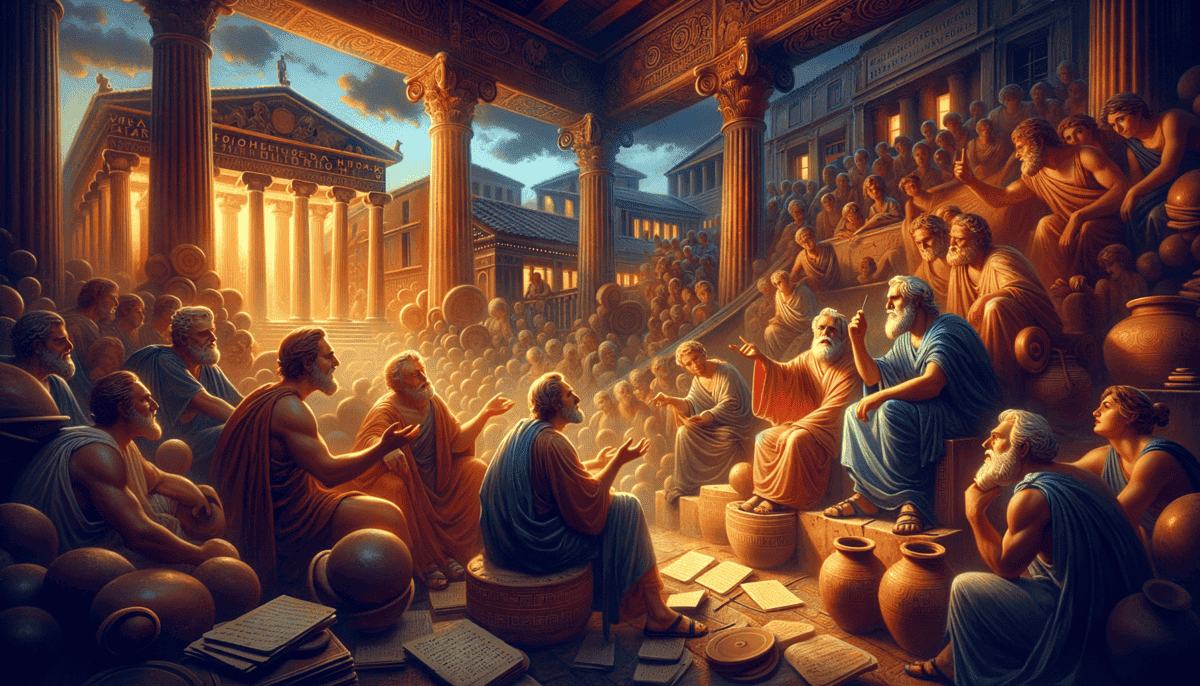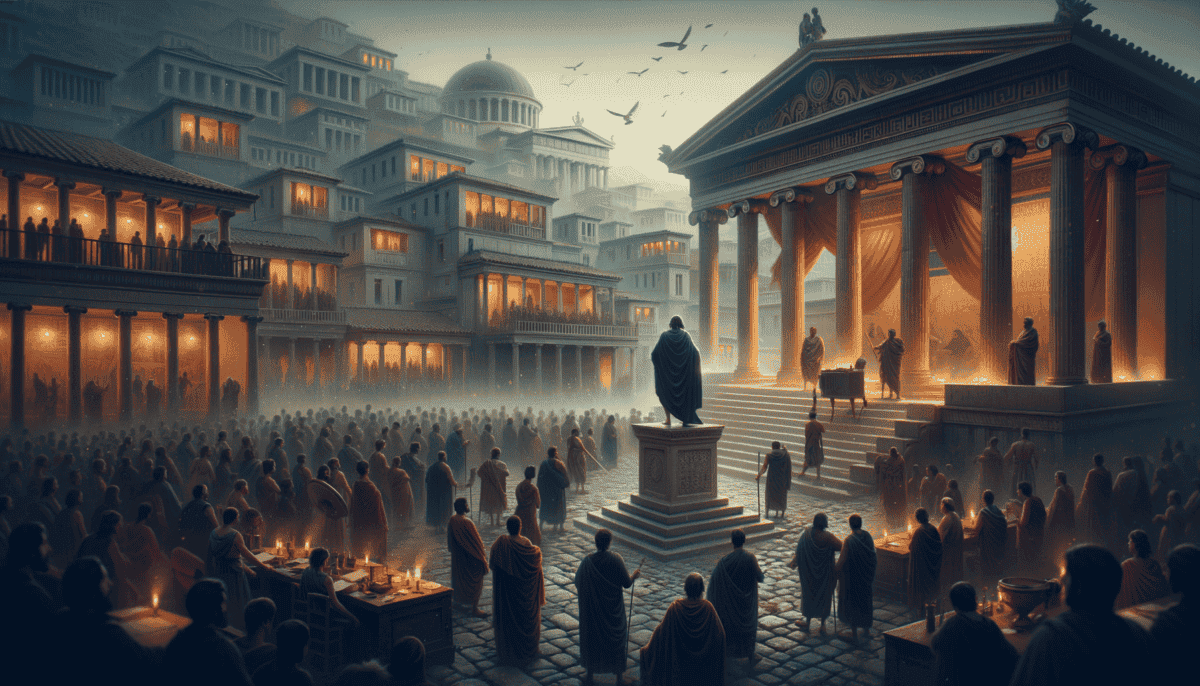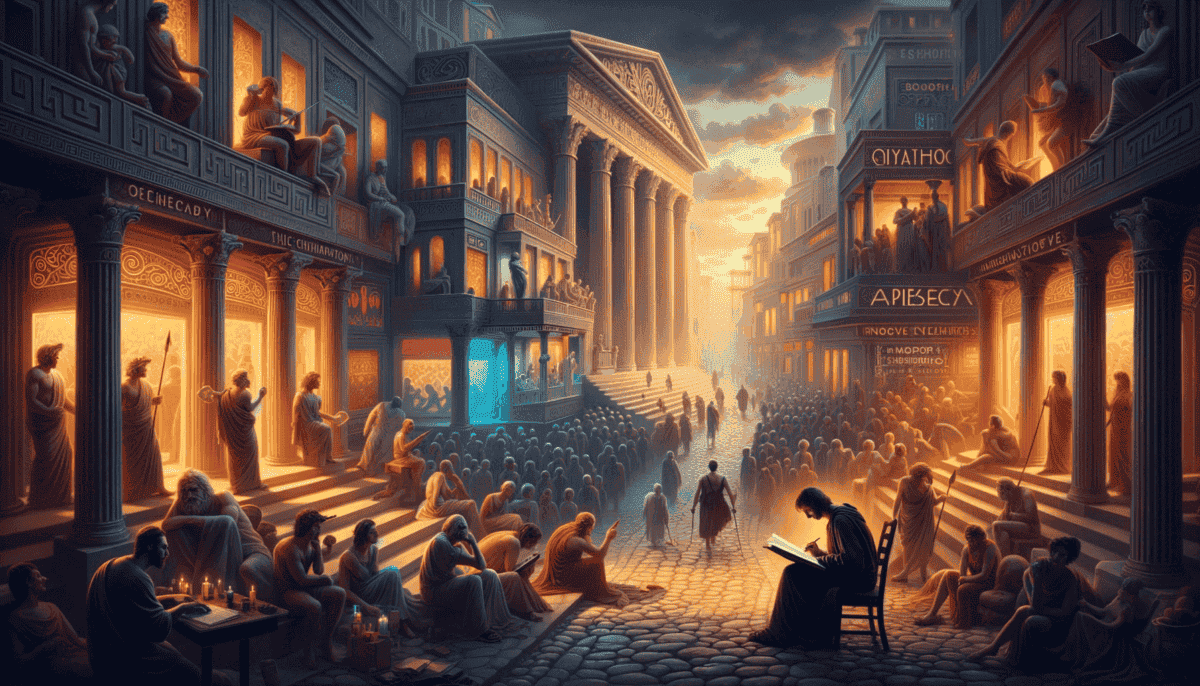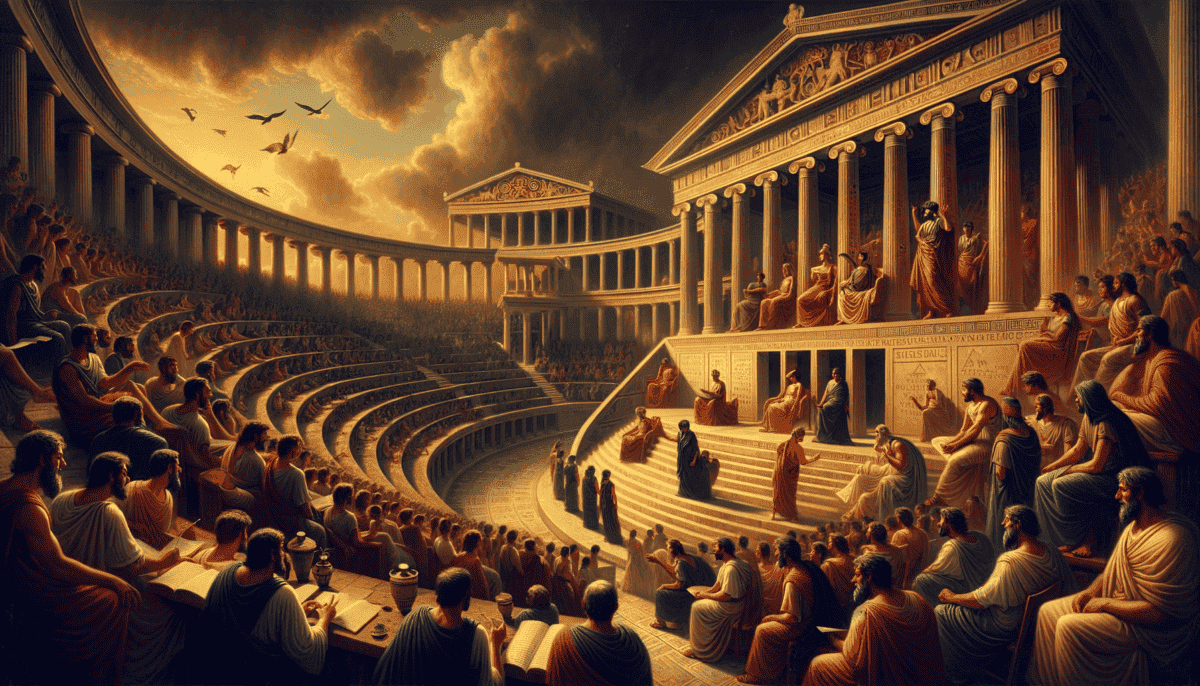The Young Rebel
Long ago in Athens, Greece, a special baby was born. His name was Euripides. The sun shone bright on that day in 480 BC, as if the gods knew this baby would change the world of plays forever.
Little Euripides grew up in a busy city. Athens was full of people talking, trading, and watching plays in big outdoor theaters. His father ran a small shop, and his mother told him stories about brave heroes and magical creatures.
“Tell me another story, Mother!” young Euripides would beg. He loved hearing tales about gods and monsters.
Unlike other kids who played games all day, Euripides liked to watch people. He noticed how some people were treated unfairly. This made him feel sad and angry. Even as a child, he wanted to tell stories that would make people think differently.
In school, Euripides was different from other students. While they memorized old stories exactly as they were told, he asked questions:
"But why did the hero do that?"
"What about the people who got hurt?"
"Couldn't there be a better way?"
His teachers didn't always like these questions. But Euripides couldn't help being curious. He wanted to know the real reasons behind everything.
The First Play
When Euripides was a teenager, he wrote his first play. It wasn't very good, and people laughed at it. But instead of giving up, he worked harder. He wrote during the day and thought about new ideas at night.
The young writer faced many challenges. Some people didn't like his new ideas. They wanted stories to stay the same as they had always been. But Euripides was brave. He knew that sometimes being different was more important than being popular.
He watched other playwrights like Sophocles tell grand stories about heroes and gods. But Euripides wanted to tell stories about regular people too. He thought their problems were just as important as the adventures of mighty warriors.
A New Kind of Storyteller
As Euripides grew older, he spent more time at the theater. He learned how actors moved on stage and how to make audiences feel strong emotions. But he didn't just copy what others did. He started thinking of new ways to tell stories.
Some nights, he would sit on a hill overlooking Athens. As he watched the city lights flicker like stars, he dreamed of writing plays that would change how people thought about the world.
His mother found him there one evening. "Why do you sit alone up here?" she asked.
"Because I'm thinking about all the stories that haven't been told yet," he answered. "There are so many people whose voices aren't heard. I want to tell their stories too."
Young Euripides didn't know it yet, but his different way of thinking would make him one of the most famous writers in history. His ideas about telling new kinds of stories were just beginning to grow, like seeds waiting to become beautiful flowers.
The path ahead would be hard, but Euripides was ready. He had his words, his dreams, and most importantly, his courage to be different. The young rebel from Athens was about to begin his journey to change the world of theater forever.
Breaking New Ground
The sun rose over Athens as Euripides walked to his first big theater competition. His heart beat fast. Today, he would compete against Sophocles, the most famous playwright in Greece.
Sophocles wrote plays about brave heroes who never made mistakes. But Euripides wanted to show real people with real feelings. His new play had a hero who sometimes felt scared and sad.
“That’s not how heroes act!” someone shouted during the performance. “Heroes are always brave!”
But Euripides knew better. He had watched real people face hard times. He knew that even brave people sometimes cry or feel afraid.
New Ways to Tell Stories
Euripides tried things no one had done before. He made his actors talk like regular people instead of using fancy words. He added more music to his plays. He even let servants and poor people be important characters!
Many people didn’t like these changes. They said:
“That’s not how we do things!”
“Plays should stay the same!”
“Who does this young writer think he is?”
But some people, especially younger ones, loved Euripides’ new ideas. They felt his stories were more real and exciting.
Learning from Losing
Euripides didn’t win many competitions at first. Sophocles usually got first place. But instead of giving up, Euripides worked harder. He watched how people acted when they were happy, sad, or angry. He wrote these real feelings into his plays.
One day, after losing another competition, a friend asked him, “Why do you keep writing different kinds of plays when people like the old way better?”
Euripides smiled and said, “Because someone needs to show that there are new ways to tell stories. Maybe people don’t like change now, but someday they will understand.”
Finding His Voice
As time passed, Euripides developed his own special way of writing. He made his characters ask big questions about life. He showed that sometimes there are no easy answers.
He wrote about things that made people uncomfortable:
- Why do we fight wars?
- Why are some people treated unfairly?
- Why do good people sometimes do bad things?
Other writers started copying some of his ideas. Even Sophocles began writing more realistic characters! Slowly, people started to see that Euripides’ different way of telling stories could be powerful.
Young actors loved being in his plays because they got to show more feelings. Instead of just being brave or angry, they could be happy, sad, scared, and confused – just like real people.
By staying true to his ideas, Euripides was changing how people thought about plays. He showed that stories could be both exciting and truthful. His brave choice to be different was starting to make a big difference in the world of theater.
The young rebel was growing into a master storyteller, and his biggest challenges – and greatest victories – were still to come.
Standing Up for Others
The morning sun shone through Euripides’ window as he dipped his quill in ink. Today, he would write something very different. He would give a voice to people who were usually silent in plays.
“But women don’t speak in plays,” his friend said, looking worried. “And slaves are just in the background.”
Euripides shook his head. “Everyone has a story to tell. Everyone’s voice matters.”
Brave New Characters
In his new play, Euripides wrote about a clever woman named Medea. She wasn’t just someone’s wife or mother. She made her own choices and solved her own problems. This was very new and different!
“Why should only men be heroes?” Euripides asked. “Women have strong feelings and brave hearts too.”
People were shocked when they saw his plays. They weren’t used to seeing women and slaves say important things on stage. Some people got angry. But others started thinking differently about these people they saw every day.
Making People Think
Euripides wrote about hard things that made people uncomfortable:
- How it feels to be poor
- What it’s like to be left out
- Why war hurts everyone
- How unfair rules hurt people
New Stories from Old Tales
Everyone knew the old stories about gods and heroes. But Euripides told these stories in new ways. He made the gods seem more like real people with feelings. He showed that heroes could make mistakes.
Some people didn’t like these changes. They thought it was wrong to show gods and heroes this way. But many people loved seeing characters that felt real.
Speaking Up for Peace
Athens was often at war. Most plays showed war as glorious and exciting. But Euripides wrote about how war hurt people, especially women and children. He wanted peace. ✌️
“Look what war does to families,” his characters would say. “Is fighting worth all this pain?”
In one play, a mother who lost her children in war cried out:
Growing Fame and Trouble
More people started coming to see Euripides’ plays. Young writers wanted to write like him. But some powerful people didn’t like his new ideas. They thought he was causing trouble.
“Your plays make people ask too many questions,” they told him.
But Euripides smiled and said, “Good! Questions help us grow and learn.”
His plays were changing how people thought about each other. He showed that everyone deserves to be heard, even if they’re different. And even though it wasn’t always easy, he kept writing stories that gave hope to people who needed it most.
The Story of Medea
Euripides sat in his garden, deep in thought. He was working on his biggest play yet – “Medea.” This play would change everything.
A Bold New Story
“What are you writing now?” asked his son, watching his father scribble on papyrus.
“A story about a woman named Medea,” Euripides replied. “She’s unlike any character people have seen before.”
“Sometimes the bravest thing is to show the truth, even when it’s hard to watch.” – Euripides
Breaking the Rules
Medea wasn’t like other characters in plays. She was strong and smart. She made her own choices – even scary ones. This was very different from how women were usually shown in stories.
People watching the play gasped when Medea spoke:
We women are the worst treated things alive.”
Hard Times at Home
While writing “Medea,” Euripides faced problems at home. His wife didn’t understand his new ideas. Many friends stopped visiting. Some people said his plays were too strange.
But Euripides kept writing. He knew his story was important.
Changing Minds
The old ways of writing plays had rules:
- Heroes must be men
- Gods must be perfect
- Women must be quiet
- Stories must end happy
Euripides broke all these rules! He showed that real life isn’t always simple or happy. Sometimes good people do bad things. Sometimes heroes make mistakes.
The Big Show
Finally, it was time to show “Medea” to everyone. The theater was full. People waited to see what strange new thing Euripides had written.
“Father, aren’t you scared?” his daughter asked.
“Yes,” he smiled. “But sometimes being scared means you’re doing something important.”
A New Kind of Drama
When the actors performed “Medea,” everything changed. The audience saw a woman who was strong, angry, and real. Some people cried. Some got angry. But no one could look away. ⭐
Even though “Medea” didn’t win first prize at the festival, it changed theater forever. People started talking about things they never talked about before.
Moving Forward
After “Medea,” nothing was the same. Other writers started creating different kinds of characters too. They wrote about real feelings and hard choices.
“Your play made me think differently about everything,” a young writer told Euripides.
But success brought new problems. Some powerful people in Athens were angry about his ideas. They thought his plays were dangerous. Euripides would soon face his biggest challenge yet.
Far From Home
Dark clouds gathered over Athens. Euripides looked at his beloved city one last time. It was time to leave. ️
A Hard Choice
“Why do we have to go, father?” his youngest daughter asked, tears in her eyes.
“Sometimes,” Euripides said softly, “we need to find a new place to grow our ideas.”
He packed his scrolls carefully. These were his treasures – all his new plays and stories.
Welcome to Macedonia
King Archelaus of Macedonia sent a special invite to Euripides:
In Macedonia, Euripides found a new home. The king gave him a beautiful house near the sea.
Writing Free
Away from Athens, something amazing happened. Euripides started writing his best plays ever! No more worrying about making people mad. No more following old rules.
The Bacchae
In his new home, Euripides wrote “The Bacchae.” This play was special. It was about:
- People who don’t listen to new ideas
- What happens when we ignore the truth
- How being too proud can hurt us
- Why we should respect others
Missing Home
Even though Macedonia was nice, Euripides missed Athens. He would walk by the sea and think about his old city.
“Do you wish we could go back?” his son asked one day.
“Sometimes,” Euripides answered. “But here, I can tell the stories that need to be told.”
A New Beginning
The king loved Euripides’s plays. He built a special theater just for them! People came from far away to see these new stories. ⭐
Looking Back
In Macedonia, Euripides thought about his life. He had changed so much since his first play in Athens. Now he was braver, stronger, and wiser.
“What makes a good story?” a young writer asked him.
“Truth,” Euripides said. “Even when it’s hard to hear.”
The Last Chapter
As Euripides got older, he kept writing. Every play was like a gift to the future. He wanted to show people that stories could change the world.
His plays traveled back to Athens. Slowly, people there started to understand what he had been trying to say all along.
Far from where he started, Euripides found the freedom to be himself. His best work was still to come, and his greatest gift to the world was just beginning.
A Light That Never Fades
The sun set over Macedonia one last time for Euripides. He was 78 years old when he finished his final play.
The Final Bow
“Father’s plays are more popular than ever,” his son said, holding a letter from Athens. “They’re performing them everywhere!”
Even though Euripides wasn’t there to see it, his dreams had come true. People finally understood his stories.
Stories That Live Forever
Euripides wrote almost 100 plays! That’s like writing a new story every few months for many years. Guess how many plays we can still read today? Eighteen whole plays! That’s more than any other old Greek writer.
Changed Forever
After Euripides, plays were different. Here’s what he taught everyone:
- Heroes can be regular people
- Women’s stories matter
- It’s okay to question old ideas
- Feelings are important to show
- Every voice deserves to be heard
Today’s Theater
When you go see a play today, you might see some of Euripides’s ideas!
“Look at the strong female characters!” a modern writer says. “That’s pure Euripides!”
“See how they show real feelings?” adds a director. “Euripides started that!”
Around the World
Euripides’s plays are still performed everywhere. From big cities to small towns, people still love his stories. They’ve been translated into many languages.
The Rebel’s Victory
Sometimes, being different is hard. Euripides knew that. But he kept writing his way, telling his truth. Now, we remember him as one of the greatest writers ever! ⭐
His daughter smiled, reading another letter from Athens: “They say father changed everything. They say he made theater better.”
The Story Goes On
Today, when someone writes a play that’s new and different, people say, “That’s just like Euripides!” He showed us that it’s okay to be brave and try new things.
In theaters all around the world, the lights go down. The curtain goes up. And Euripides’s spirit lives on in every story that dares to be different.
The rebel who changed Greek drama became a hero after all. His greatest victory wasn’t winning contests – it was changing how we tell stories forever. And that’s a light that will never fade. ✨






